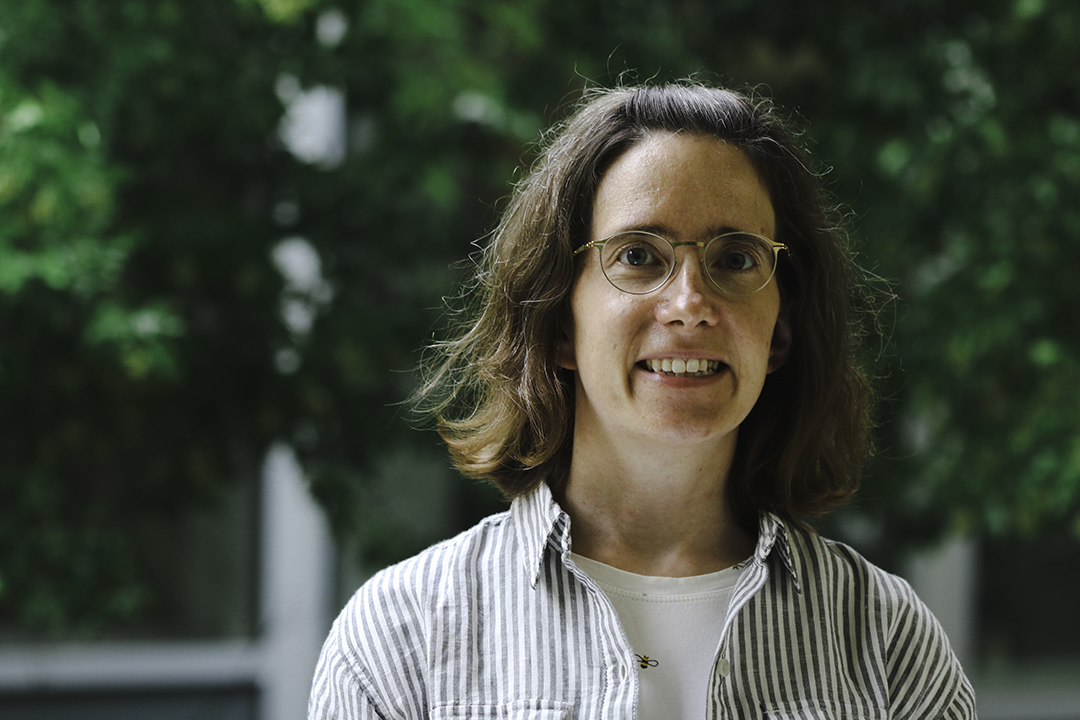
WCVM hires pollinator health research chair
A new University of Saskatchewan (USask) research chair position at the Western College of Veterinary Medicine (WCVM) will focus on the health of pollinators that play an integral role in global food production and agricultural sustainability.
By Jeanette NeufeldDr. Sarah Wood (PhD, DVM) is the new USask Pollinator Health Research Chair at the WCVM. Wood is a USask alumni who earned Doctor of Veterinary Medicine and PhD degrees from the WCVM, and who has worked on research related to pollinator health since 2015.
“My long-term vision for this research chair position is to enhance agricultural sustainability and ecosystem health by studying managed and wild bee species from a veterinary perspective. By applying veterinary research tools to address the ongoing challenges to pollinator health and biodiversity, I think we can make impactful change,” says Wood.
Animal pollinators—most of which are insects—are involved in two-thirds of global food production. Through their daily work, pollinators enable plants to successfully grow and produce crops. Among all pollinators, honey bees have the greatest impact on global crop production.
“As the first North American veterinary college to establish a honey bee research and teaching program, we are the ideal home for this new research chair. We are so grateful to the support from industry partners who recognize the need for these discoveries at such a critical time when honey bees and other pollinators are facing major health challenges,” says WCVM Dean Dr. Gillian Muir.
“This new research position is an exciting step for our college as our researchers strive to protect the health of both managed and wild pollinators, and in doing so, to improve agricultural sustainability in Canada and throughout the world.”
The new chair position was established through a $750,000, five-year funding commitment from the Saskatchewan Beekeepers Development Commission ($250,000), BASF ($250,000), SaskCanola ($150,000), British Columbia Blueberry Council ($50,000) and Manitoba Canola Growers ($50,000).
The research chair builds on the strengths of the college’s existing honey bee health research group, which is based in the WCVM’s Department of Veterinary Pathology. Led by Dr. Elemir Simko, the WCVM was the first veterinary college in North America to establish a honey bee research and teaching program in 2015.
“As members of the veterinary profession, we are uniquely prepared to tackle big questions around pollinator health, while doing so in a way that balances the need for high-quality food production with protection of pollinators and ecosystem health and biodiversity,” says Simko.
The group has steadily expanded its research program in the past seven years—thanks to more than $2 million in industry and government funding support. The group’s research work focuses on ecotoxicology, pesticide risk assessment and infectious disease. The research chair position will now allow work to expand in these key areas while training a new generation of veterinary professionals, beekeepers, researchers and policy makers.
Quotes:
"This was a generational opportunity to be a part of securing the future of honeybee and pollinator health research in Saskatchewan. So, while the financial commitment for this project was significant for a small industry such as the Saskatchewan beekeepers, there was never any question that we would do whatever we could to see this initiative through to completion. Now, just a few short years later, it is coming to fruition. We are confident that the Pollinator Health Chair position will serve as the foundation that ensures Saskatchewan will remain at the forefront of honey bee health research in Canada. As such, the Saskatchewan Beekeepers Development Commission (SBDC) is honoured to be a financial supporter of the Pollinator Health Chair Position at the Western College of Veterinarian Medicine and grateful for the vision and leadership of Dr. Elemir Simko and his team who have made this idea a reality," - Nathan Wendell, president, SBDC
“As an agricultural solutions provider committed to balancing productivity and sustainability, we understand the need to support modern agriculture, while ensuring the responsible use of plant science technology, including the protection and creation of biodiverse communities. When we learned of this role and its mission, we immediately recognized the tremendous value it would bring to the Canadian agricultural industry, and we are proud to enable vital research and future innovations that will benefit the community,” - Jeff Bertholet, manager, technical service, BASF
“SaskCanola is proud to support this Research Chair in Pollinator Health because pollinators are essential for canola production, so any threats to them are also a threat to farmers. Given the complex interactions of threats to insect pollinators worldwide, including several devastating diseases and parasites that are affecting bee colonies, it’s important to Saskatchewan canola farmers to support unbiased research to better understand these issues and to develop environmentally sustainable solutions that benefit both farmers and pollinators.” - Tracy Broughton, executive director, SaskCanola
“British Columbia’s blueberry crop relies on the pollination services provide by commercial honey bees. Through investigation of the root causes of diseases such as European foulbrood (EFB), the ongoing research at the WCVM to improve bee health is critical to the long-term security of honey bee supply to blueberry growers. The BC Blueberry Council is pleased to support the establishment of the WCVM’s Research Chair in Pollinator Health, and we look forward to continued and successful collaboration with the University of Saskatchewan. With the goal of enhancing the interface between blueberry and honey producers, we are working together to ensure the viability of these production systems as well as the safe, abundant supply of Canadian blueberries and honey.” - Eric Gerbrandt, Ph.D., research director, British Columbia Blueberry Council
“We are excited to support increased bee health research capacity across the Prairies through our sponsorship of the WCVM Research Chair in Pollinator Health. We work closely with the Manitoba Beekeepers Association, and this investment expands our commitment to a healthy bee population. Bees love canola, and canola loves bees. Both our industries grow when we work together.” - Delaney Ross Burtnack, executive director, Manitoba Canola Growers
